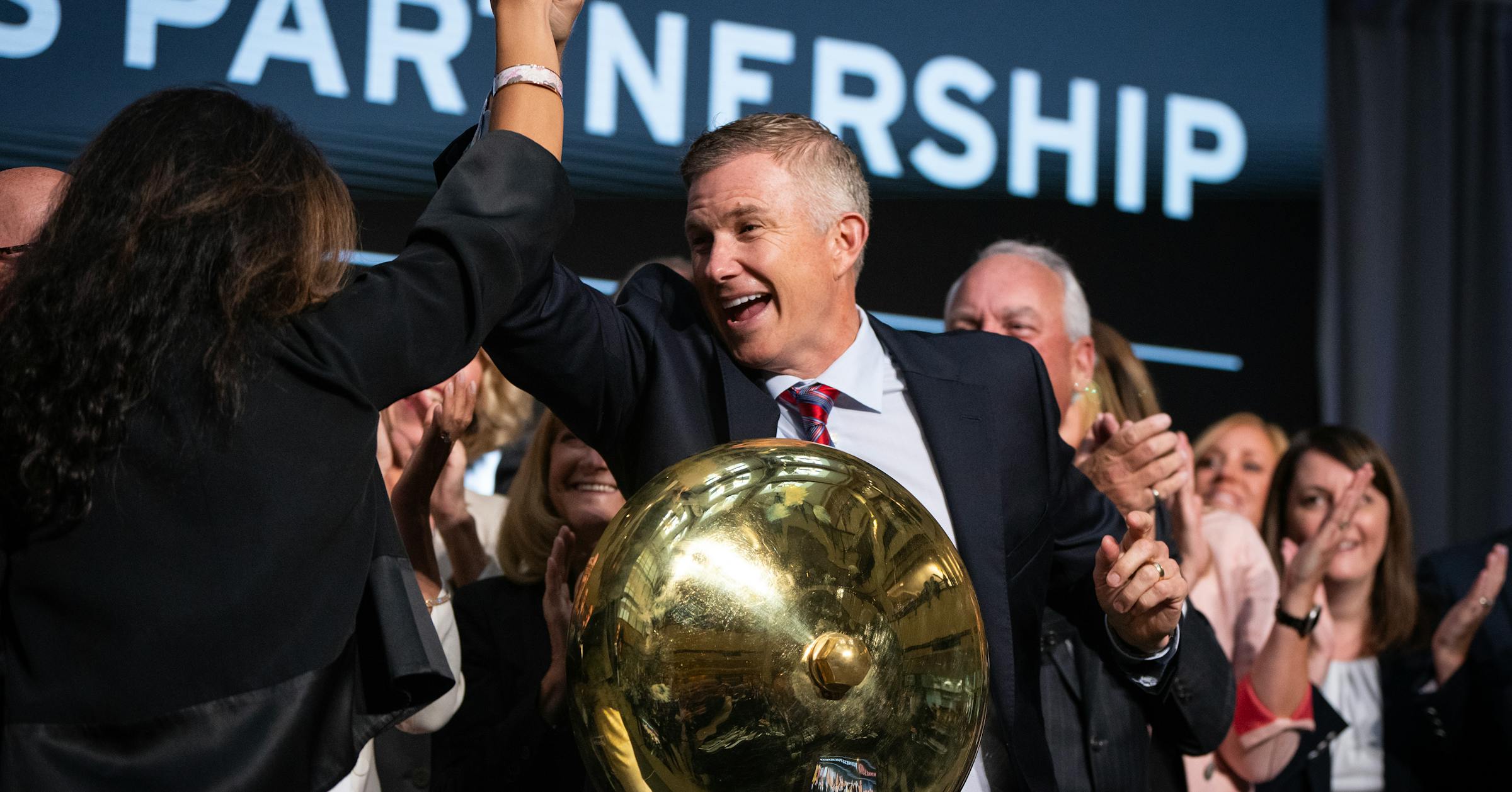In a unique opening bell ceremony held at Medtronic’s campus in Fridley, Minnesota, local CEOs gathered to celebrate the state’s economic achievements while highlighting potential challenges. On October 26, 2023, executives from Minnesota’s 17 Fortune 500 companies underscored the importance of maintaining a pro-business environment, advocating for favorable taxation and regulatory policies. The event, which featured a surprise appearance by the Minnesota Vikings’ mascot, served as a platform for leaders to share their visions for the future of Minnesota’s economy.
Geoff Martha, CEO of Medtronic, who emceed the event, expressed the urgency of innovation in sustaining economic growth. “It doesn’t take long to see a state fall apart,” he stated, emphasizing the need for continued investment in the innovation ecosystem. He noted, “Innovation is where the world’s going. The U.S. leads in innovation.”
The ceremony was organized by the Minnesota Business Partnership, of which Martha is chair. Attendees enjoyed a breakfast of eggs, potatoes, and bacon while discussing the resilience and adaptability of Minnesota’s business landscape. Jeff Harmening, CEO of General Mills, remarked on the collaborative spirit of Minnesota businesses, stating, “We listen, and we adapt, and we participate.” He emphasized the importance of building trust and shared values in fostering a thriving corporate environment.
Minnesota’s capital city, along with its metropolitan area, ranks highly in the U.S. for Fortune 500 companies per capita, according to the Minnesota Department of Employment and Economic Development. Harmening explained that companies choosing to establish their headquarters in Minnesota often invest not only in office spaces but also in local neighborhoods, schools, parks, and cultural institutions.
Best Buy CEO Corie Barry, who hails from rural Minnesota, highlighted the state’s appealing environment for attracting talent. “This is a space where leaders lean in and want to be a part,” she noted, reinforcing the notion that Minnesota’s quality of life plays a crucial role in retaining skilled professionals.
Martha shared the historical significance of Medtronic’s innovations, recalling the introduction of the first battery-powered pacemaker in the 1950s. He pointed to the success of Inspire Medical Systems, which developed a sleep apnea device and grew into a multi-billion dollar firm, stemming from local talent. “Talent’s a key piece,” he said, adding, “But money matters too.”
Concerns regarding regulatory challenges were voiced by Kurt Zellers, CEO of the Minnesota Business Partnership. He noted that current regulations could delay the construction of new facilities by several months. Zellers remarked, “We don’t have to be at the bottom of the corporate tax bracket, but boy, we sure got to get out of the top five.”
U.S. Bancorp CEO Gunjan Kedia echoed these sentiments, warning that excessive taxes and regulatory hurdles could drive companies to relocate. “There comes a time when, if it is that difficult to open a new building or start something new, you just say, ‘Maybe I go somewhere that doesn’t take years to unravel the regulatory approval process,’” she said.
The Minnesota Business Partnership has been advocating for a research and development tax credit, which Zellers describes as vital for the survival of startups in the state. “Whether they survive, thrive, and then grow to a point where Medtronic or someone else wants to buy them,” he explained, highlighting the potential impact on future economic growth.
Despite relocating its corporate headquarters to Ireland more than a decade ago for tax benefits, Medtronic has maintained a significant presence in Minnesota. Martha reassured attendees that the company has exceeded its commitment to create 1,000 jobs in the state. “I think we resoundingly proved the skeptics wrong,” he stated, adding that Medtronic has increased its investment in research and development both locally and globally over the past decade.
The event not only celebrated the achievements of Minnesota’s business community but also served as a call to action for sustained investment and legislative support to ensure continued economic vitality. As the CEOs outlined their visions for a robust Minnesota economy, the overarching message was clear: collaboration, innovation, and proactive policymaking will be essential for navigating future challenges.
